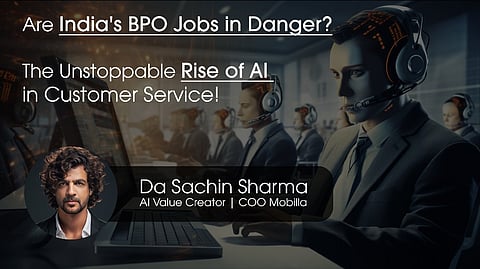

India's customer service industry is experiencing a paradigm shift, fuelled by the transformative power of Artificial Intelligence (AI). A case in point is Dukaan, a DIY e-commerce platform enabling merchants to set up digital stores with zero coding skills. Following the deployment of an AI chatbot for customer support, Dukaan recently downsized its human workforce by 90%.
The company's CEO, Suumit Shah, unveiled that the chatbot implementation plummeted customer query resolution time from 2 hours and 13 minutes to just 3 minutes and 12 seconds. While this strategic move fostered operational efficiency and cost-effectiveness, it also gave rise to significant workforce displacement. Thus, AI in customer service emerges as a double-edged sword, simultaneously heralding advancements and potential unemployment risks.
Known for its vast workforce proficient in multiple languages, India has long held a dominant position as an outsourcing hub for customer service roles. However, the rapid emergence of conversational AI tools, such as OpenAI's ChatGPT, is ushering in new challenges. The swift evolution of AI is not limited to text-based customer interactions. It's also transforming voice-based customer service with AI-powered bots that can provide responses indistinguishable from human responses, thereby intensifying concerns about potential job displacement across a multitude of languages.
ChatGPT, although not designed explicitly for customer service, holds immense potential to revolutionize the domain. It can manage basic support tickets, offer multilingual support, perform sentiment analysis, and generate personalized responses. The technology is not yet ripe for full-scale deployment, but companies can leverage its capabilities to stay competitive.
Despite the progression, AI is designed to assist human agents rather than replace them. By taking over mundane, repetitive tasks, AI allows human agents to tackle more complex and rewarding tasks. This integration enhances productivity and scalability without undermining customer satisfaction.
However, as AI integration augments efficiency, it also necessitates the development of new skillsets. Prompt Engineering, a burgeoning field where AI responses are fine-tuned based on prompt design, is a prime example. For effective AI deployment within customer support, it must be capable of integrating with a company’s business systems, understanding policies, ensuring brand safety, and providing logically consistent responses.
Even as AI technology advances, it's paramount for employees to adapt and upskill. Developing new core competencies, such as prompt engineering, will be crucial to maintaining relevance in the evolving job market.
While AI's efficiency is undeniable, human intervention remains indispensable for tasks requiring empathy and understanding. Building trust and rapport with customers, discerning subtle cues, and adapting to unique situations are areas where humans outshine AI.
According to a Harvard Business Review study, customer service work can be categorized into four types of tasks: fully manual, fully automatable, semi-manual, and new tasks that arise with AI. The goal is not to replace humans with machines, but to orchestrate a harmonious synergy that leverages the strengths of both.
As per Zendesk's 2023 CX Trends report, 59% of customers crave personalized support experiences, a goal AI can help fulfill. As we navigate the AI revolution, businesses need to strategically incorporate AI into their operations, while employees must continuously upskill to stay relevant.
The future of India's BPO and customer service industry hinges on the collaborative potential of humans and AI, rather than a competition between the two. By perceiving AI as an enabler rather than a replacement, India can retain its global leadership in customer service and BPO services. However, this transition must be executed with empathy and foresight, minimizing workforce displacement and empowering the human workforce to thrive in an AI-augmented future.